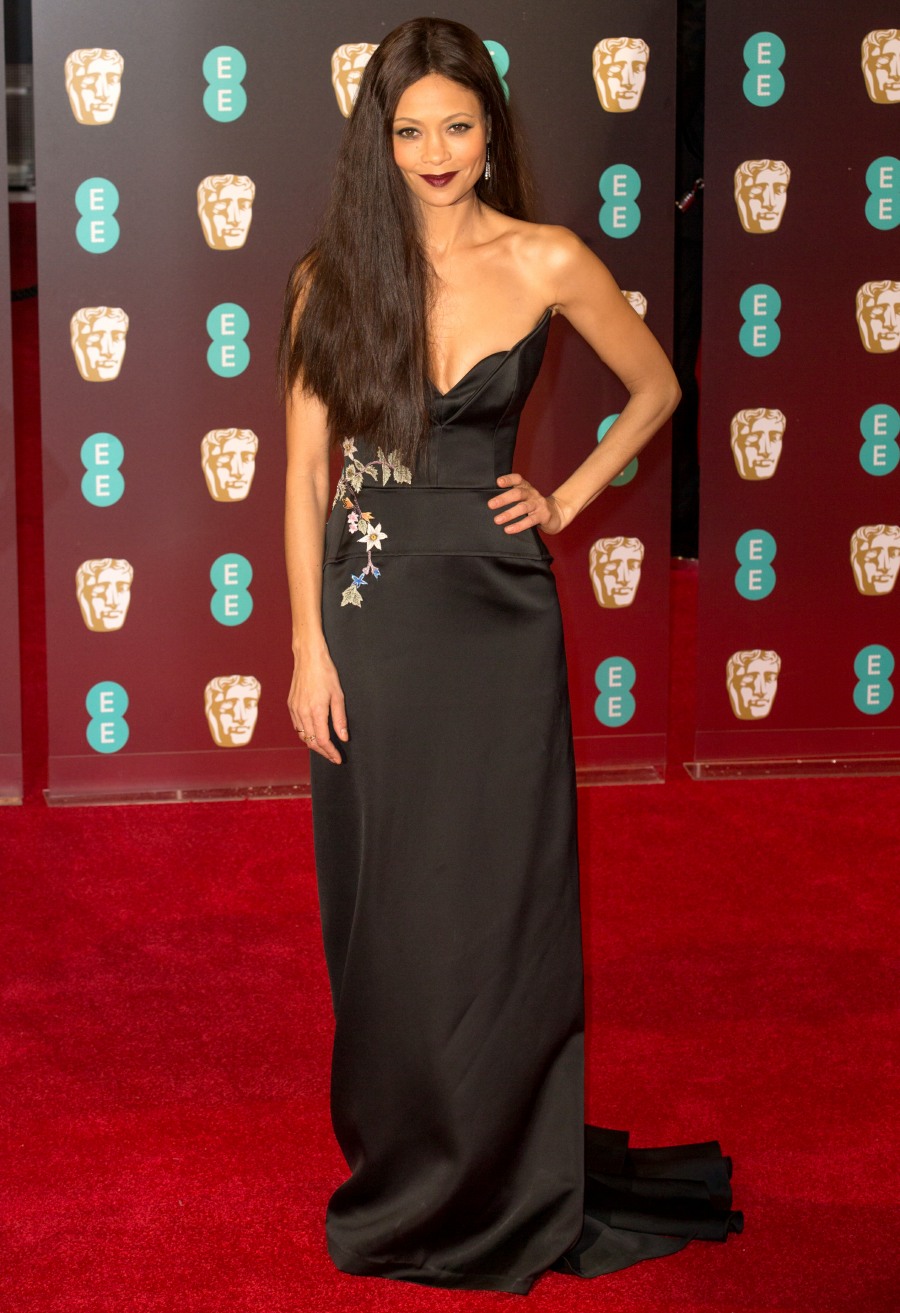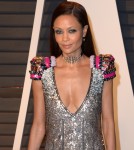Another actor has entered the ongoing conversation about black British actors versus African-American actors. Samuel L. Jackson got the ball rolling when he complained about how a black British actor doesn’t have the same lived history with interracial dating in America, and Sam’s comments were particularly about Daniel Kaluuya in Get Out. I still believe that Sam was not “slamming” or “shading” Kaluuya, by the way. Kaluuya responded in kind, basically saying that he doesn’t want to put in a position where he has to defend his blackness. Sam later clarified his comments and throughout it all, I felt like it was an interesting conversation to have, as opposed to two actors sniping at each other.
I also made the point that many black British actors come to America to work because – despite #OscarsSoWhite and the systemic racial inequalities of Hollywood – there are simply more opportunities for black actors in America. The British film and TV industry is thriving, but the Brits thrive on all-white costume dramas and period pieces which conveniently feature whitewashed history. Well, as I said, another actor has chimed in. This time it’s Thandie Newton, a British actress who now lives full-time in LA.
British period dramas may be entertaining, but they simply don’t have good roles for people like Thandie Newton. In an interview with the Sunday Times Magazine, Newton, who now lives in Los Angeles, explained that the popularity of historical dramas, which tend to focus on white characters, means that it’s hard to find roles as an actor of color. “I love being [in the U.K.], but I can’t work, because I can’t do Downton Abbey, can’t be in Victoria, can’t be in Call the Midwife,” the Westworld actress said. “Well, I could, but I don’t want to play someone who’s being racially abused.”
“I’m not interested in that, don’t want to do it,” Newton, who will soon appear in the Star Wars Han Solo movie and also signed on for a role in the Brit cop drama Line of Duty, added. “There just seems to be a desire for stuff about the royal family, stuff from the past, which is understandable, but it just makes it slim pickings for people of colour.”
Newton’s fellow British actor David Oyelowo recently made a similar critique of the British film and TV industry, though he added that people making period films and shows tend to ignore nonwhite British history. “People of color have been expunged from Britain’s history,” the Selma and United Kingdom star said. “One of the best ways to illustrate how integrated we are historically is to have a piece of entertainment that people can also learn from while they are watching it. That is why I am hellbent on period drama: We need the context so we can build, and then go on to grow.”
I get it. And Thandie’s comments echo David Oyelowo’s comments and Idris Elba’s comments and Daniel Kaluuya’s comments and who knows? I kind of think Chiwetel Ejiofor probably feels the same way too, although Chiwetel still lives in London for the most part (because he manages to get a lot of stage work too). When a British film or TV show does feature an actor of color – I’m thinking about Rose’s lover in Downton Abbey – it does feel like the worst kind of Old-Empire tokenism.
So… when will #BaftasSoWhite become a thing? Did you know that Denzel Washington has never been nominated for a BAFTA? Morgan Freeman has never been BAFTA-nominated either. Chiwetel did get nominated – and he won! – for a Bafta for 12 Years a Slave. As I was researching this story, I came across this piece from 1996, when black actors protested that year’s BAFTAs because of the lack of diversity. This has been a thing for decades. Maybe it’s time for the British film and television industry to actively search for and greenlight projects which would employ some of their talented actors of color.
Photos courtesy of WENN.
















Amazing woman. She should be in everything. I know it would not be historically correct (sight!) but she would make a hell of a Catherine the Great. She has the passion.
I’d like to see an actual Russian or German play Catherine instead of the usual Brit.
haha yep……………… but who would ever think of THAT 😀
Oh my word, She is one STUNNING WOMAN. Damn!
I thought she was J Wow from Jersey Shore!!
She had a long fallow period because she chose family over work.
She was one of the few black actors who was working in the British film industry until that self imposed timeout.
It makes me side eye her comments.
If you don’t mind my asking, do you disagree with the specifics of her statement? Because Thandie has indeed done an awful lot of her more recent work in American productions.
I’m watching three contemporary British TV dramas at the moment – Line of Duty, Broadchurch, Lucky Man. All with POC in the main cast, two with POC as leads. Recent watches with POC in leads include Unforgotten and Fortitude. They also seem to be making some efforts with period drama of late – I notice Harlots has POC in the cast and is set in London in the 1700s, for example and nothing to do with suffering in racist histories.
In Britain, it’s more accurately described as #baftassoposh. And this doubly messes things up for POC due to intersectionality. Things could and should be much better. Theatre here, I think, is ahead of TV and film for diversity.
That said, the UK industry is what? A fiftieth the size of the US industry? It’s not just British POC actors who run stateside for more opportunity: it’s all of them. No wonder: there are fifty times more opportunities. I do think some of the acting ex-pats passing comment deliberately ignore the improvements that have been made since they gave up trying and left for stateside.
And I’ll say it again – it would greatly help our industry here to stop relying on period drama that favours the white and the posh over the POC and the working class IF AMERICANS STOPPED BUYING IT AND MAKING IT AN EXPORT PROFIT. We weren’t the ones giving tat like Downturd Abbey all the award nominations.
Sorry. Crabby post. But this is my bugbear.
Just to add to this and emphasise the class consideration here. Middle-to-high brow drama is much less diverse than low-to-middle brow in terms of TV drama. Main casts for the UK’s two most watched TV dramas from the low-to-middle brow range, Casualty and Holby City, are really diverse. And yet get higher viewing figures than anything nominated for a BAFTA. Reason? Poshness. Elite social closure. Mostly in terms of commissioners and producers.
Yes to all of this Sixer. While there’s definitely a long, long way to go, particularly in historical dramas, British TV is more diverse than the American perception of it, and it would be great if there was a bigger push from producers to commission and then showcase other work overseas.
And now I want to know what your Broadchurch theories are :p
@Sixer – see my comment below. I too have the impression that British theatre is ahead of tv/film here.
I don’t know if Thandie Newton is interested in theatre – no particular reason why she would be, or has to be – but the story does to my eyes look rather different and more diverse in theatre. The talent often travels the other way for theatre – American stars want to come to Britain to act on the stage.
@sixer Thandie was great in Line of Duty last week, the character’s interesting and very intense
Bex – I’m thinking the ex-husband but that’s too obvious, so I shall say it was Lenny Henry wot dunnit!
Anon – theatre indeed much more diverse, I think because it’s less risk averse.
Sisi – I thought Thandie was deader than dead. Although I suppose I knew she couldn’t be in the first episode. I actually screamed at the end of that episode!
I am not sure it is always risk taking per se in the bigger companies. The RSC has been criticised for being staid and it definitely gravitates towards the more “tourist friendly” end of the repertoire. Similarly a revival of Amadeus is not what I’d call a risk-taking production. It’s almost the opposite – they know they will get bums on seats come what may, so they are in a position to give 2 fingers to people who complain that the histories, or plays about 18h century Vienna, should be all white.
I do think that the commitment to new writing is more risk taking and that that makes a huge difference – it creates a space for non Downton voices to be heard. And there are other things that help. The Royal Court, for example, does not accept new writing about historical figures. That pushes the repertoire away from posh costume drama.
Anon – yes, you’re right. I think I meant that you’re more likely to get brownie points for innovation in theatre than you are in TV, which heavily relies on the safety of genre. I love what they did with the re-opening of the Bush Theatre, with half of the new season coming from BAME and refugee writers. Back of house is as important as front, if not more, I think. I’d rather see diverse storytelling develop than simply shunt diverse casts into already existing genre formats. Well, I’d like both but if I had to choose, I’d go with storytelling.
“The RSC has been criticised for being staid and it definitely gravitates towards the more “tourist friendly” end of the repertoire.”
To be fair we did do an almost all black Hamlet relocated to West Africa last year. Was a big hit.
@spiderpig I’ve been going to the RSC for about thirty years and you’re right – some of the most brilliantly innovative and thrilling theatre I have seen was within its walls. In 2008 I saw the entire histories cycle over 3 days as part of the Complete Works Festival – hands down the best theatrical experience of my life and an extraordinary feat for the actors involved. But that example proves my point about safe choices – since then I don’t think I have see all three of the Henry VI plays in a season at the RSC. Henry IV I and II certainly have been on the menu – because the Henriad is a well known and popular choice. Likewise plays such as The Two Noble Kinsmen, Pericles and King John are rarely staged. The plays that form part of this year’s Rome season I have seen done by the RSC on multiple occasions. They are fairly safe/touristy/A Level texts (though I admit with a side of extreme violence and bloodletting in Titus!).
It goes in phases I feel – some artistic directors have a great vision for the company, some less so. The programme at the Swan similarly varies. It’s been excellent in recent years at staging plays by Shakespeare’s contemporaries, some of which rarely see the light of day and deserve to be performed more. But it has also had some dire periods – yet another production of the Alchemist or Volpone (zzzzz) or – my particular bugbear – endless middle of the road productions of Ibsen and Chekhov which were also not what the Swan was set up to do, ie act as a venue for drama written by Shakespeare’s contemporaries.
is that a bad Cher wig in these pics?
I think she looks amazing and love the dress and lips but yeah hair is pretty thick and long so likely wig
South Asians are by far the largest minority in the UK. Do they often complain about not being able to find work in their home country? At least black British actors usually don’t have as much trouble finding work in America. I don’t see any Indians/Pakistanis/et. al. in Westworld. As usual the argument always devolves into white and black and excludes everyone else.
I would love to see more Indian and Indian origin actors in movies and TV. It does seem to be improving. I watch the magicians and there is an Indian origin lead actor as well as a biracial actress with part indian ethnicity. Their indianess is never mentioned though.
In case they are not actually Indian origin, I should probably say South Asain.
I so agree, I feel like the conversation of diversity is always about black and white but diversity to me means people of all backgrounds, sizes and colours.
Thandie is a biracial black woman, who is speaking about her experience. If other POCs want to move these conversations beyond black-and-white, it’s up to them to do so. However, when people like Priyanka Chopra get asked about #OscarsSoWhite, for example, they really don’t say much. That said, Asian Americans like Margaret Cho, Constance Wu, etc., have done a good job pointing out how Asian Americans have been traditionally whitewashed out of Hollywood. I’ve written extensively about how Hollywood stereotypes and limits Asians, Arabs, Native Americans, Latinos and even white ethnics like Italians. That said, I don’t expect a biracial black woman like Thandie Newton to discuss the experiences of other people of color because she’s discussing her own unique experience. She should not be faulted for doing so.
I’m not sure I agree 100% with you, while understand and see your point. White feminists get called out all the time for not doing enough for their counterparts of colour but by your reasoning they should only speak to their unique experiences. I think the point we were trying to make is that the discussion needs to become bigger.
Well in this interview Thandie specifically states that it’s hard for “people of color” to find work in Britain. Not sure why it’s assumed that she was only referring to black people. Her comments could easily apply to Asians as well.
I agree that diversity must be about ALL races, ethnicities, sizes, ages, abilities, sexual orientations, genders, etc. BUT … why is it that people only remember about #AllDiversityMatters when black women speak up about their experiences? Don´t step on black women´s backs!
Laura, couldn’t agree more. +100000 from me!! Many studios/people producing these shows definitely think ‘Oh we’ve cast one black actor, how diverse! How boundary smashing! Right, onto the next white character.’. By all means laud the inclusiveness of dramas and the like for giving a shot to black actors alongside white but this should NOT mean we are approaching diversity in any way.
Jeez. No one is excluding you but YOU! If you want to start this conversation, then do it. Why must every conversation about black people being excluded have to include everyone else? I’m so sick of this. Whenever a black person brings up THEIR experience, someone always pipes in with ‘what about us?’ Well, what about YOU? You have a speaking apparatus just like us. How about using it instead of waiting on us to do the job for you?
I liked the way BBC diversified The Musketeers. I think someone had the bright idea to just show that France had colonies and connections all over the world, so naturally there were people with African, South-American and Asian backgrounds present in France. I also liked that it wasn’t emphasized in the story, except when it actually mattered.
Makes sense to do that as Alexandre Dumas was biracial.
There was a BBC costume drama featuring mostly a black cast called “Small Island” with Naomie Harris in the lead. It was great, and “Indian Summers” airs now too (about the last days of the Raj).
I think the UK needs to embrace other historical viewpoints that occur in a “period” setting. I mean, Indians have been in the UK since Victorian times (apparently Heathcliffe in Wurthering Heights was of mixed Indian descent).
Or be willing to cast non-white actors for white roles in the way that white actors are cast for non-white roles (e.g. Sophie Okonedo in Richard III) *.
* This obviously applies to casting in the US as well.
I think in British theatre that already happens more. The Royal Shakespeare Company has been casting colour blind, including in the histories, for a long time now (going back at least to 2000 when David Oyelowo played Henry VI). This season’s Rome plays at the RSC include Coriolanus (played by Sope Dirisu) and Antony & Cleopatra (with Cleo played by Josette Simon, & directed by Iqbal Khan). The third play is Julius Caesar with the lead played by a white actor, Andrew Woodall. To have 2 out of 3 leads in a season played by black British actors, and one of the three plays directed by an Asian-British director, indicates to me that it isn’t all doom and gloom in British theatre. The rest of the ensemble is also racially diverse – or at least to a degree that seems broadly reflective of Britain’s racial mix as a whole. In London the Donmar is currently playing The Resistible Rise of Arturo Ui with Lenny Henry in the lead; and the National Theatre has a current production with Lucien Msamati as Salieri in Amadeus. I appreciate these are only examples, but they are positive indicators that directors at some of Britain’s best known theatre companies are casting colour blind.
Brilliant comment, Anon.
There are definitely challenges in making diverse work, but in my experience pretty much everyone (outside of commercial West End which I don’t tend to work in) has a genuine commitment to making theatre more representative.
TV is harder, film harder still. There are issues with opportunities for young actors to break in. But I think theatre is leading the way.
I remember being in awe of her beauty and on-screen grace in Mission: Impossible II (2000). She was mesmerizing. I’d love to see her in more action stuff, more drama, more everything. Go, Thandie – Hollywood, cast her more, please!!!
I love you your wife I need your help now
She was the most beautiful actress when I first saw her in the movie with Tom Cruise and she still is beautiful.